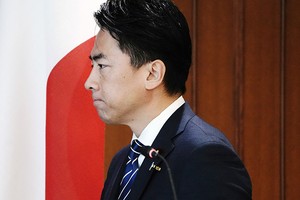By TOMOHIRO YAMAMOTO/ Staff Writer
January 13, 2021 at 18:30 JST
 Yasutoshi Nishimura, the state minister in charge of economic revitalization, answers questions during a Lower House Cabinet Committee session on Jan. 13. A transparent acrylic board is set up as an anti-coronavirus measure. (Kotaro Ebara)
Yasutoshi Nishimura, the state minister in charge of economic revitalization, answers questions during a Lower House Cabinet Committee session on Jan. 13. A transparent acrylic board is set up as an anti-coronavirus measure. (Kotaro Ebara)
The state minister heading up the central government’s fight against the novel coronavirus pandemic is urging the public to not go out for lunch with others and to eat at home instead.
Yasutoshi Nishimura, who is also in charge of economic revitalization efforts, made the comments at a news conference on Jan. 12 out of concern that the government’s call for more self-restraint is not getting through to everyone.
The government urged eateries and bars in Tokyo and the three surrounding prefectures under a state of emergency to shorten their hours and close shop by 8 p.m. But when that happened, some people simply switched from going out to dinner to having lunch with others.
Nishimura showed concern that people are not getting the message about avoiding nonessential outings.
“We are not saying that it is OK to have meals together during lunchtime,” he said. “Please work at home as much as possible and have meals at home.”
The government recently revised its basic policy in accordance with the state of emergency declared on Jan. 7.
The revised policy asks residents to refrain from unnecessary outings and largely work at home. It also urged event operators to bring about stricter limits on the number of visitors, and it requested eating and drinking establishments--seen as key places where the virus can easily spread--to shorten their business hours.
Nishimura reiterated at the Jan. 12 news conference that it is important to stop the steady flow of people into restaurants and bars.
But declaring a state of emergency has not stopped some people from flocking to main entertainment and shopping districts in Tokyo and the three neighboring prefectures in the daytime during the three-day holiday period from Jan. 9 through 11.
“What we have said in the past was partly misunderstood, but we would like residents to stay at home as much as possible, including during the daytime,” Nishimura said.
He talked about the previous state of emergency declared last April and said if the shortened business hours or telework are adopted across the board, “there are some possibilities that we can halve the number of new cases of infection in a month.”
Health minister Norihisa Tamura also said Jan. 13 that there is a “misunderstanding” among some people that they do not have to refrain from eating out in large numbers before 8 p.m.
“We are asking the public not to engage in nonessential outings even before 8 p.m.,” he told a health ministry expert panel on novel coronavirus measures. “We want to seek their understanding.”




















A peek through the music industry’s curtain at the producers who harnessed social media to help their idols go global.
A series based on diplomatic documents declassified by Japan’s Foreign Ministry
Here is a collection of first-hand accounts by “hibakusha” atomic bomb survivors.
Cooking experts, chefs and others involved in the field of food introduce their special recipes intertwined with their paths in life.
A series about Japanese-Americans and their memories of World War II